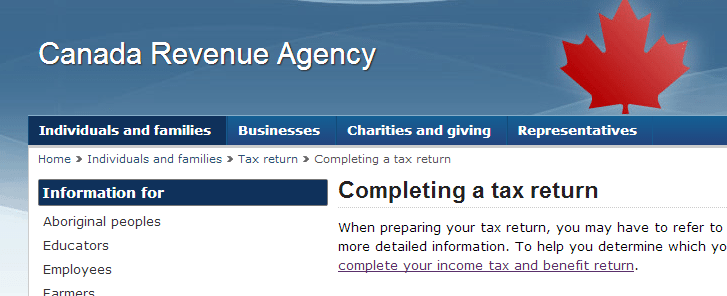Filing taxes is definitely one of the least fun parts of a working holiday in Canada but also one of the topics I receive the most emails about.
The most common source of confusion is usually regarding residency status for tax returns.
With most working holiday participants arriving mid-way through the tax year, the majority will need to consider their tax residency status at some point.
Offering advice on determining residency status to working holiday participants is difficult as it is quite subjective and everyone’s situation is, of course, different.
There are many determining factors and as a general rule, no two cases are the same.
Having said that, this post will share some tips to help determine your own tax residency status.
There are some affiliate links included in this post – if you make a qualifying purchase through them, I may receive a small percentage of the sale at no extra cost to you.

Filing taxes: the basics
The Canadian tax year runs from January to December.
Not many IEC participants will arrive right at the start of the tax year, so this is one reason why tax residency status is a much-discussed issue.
Income tax is usually automatically deducted from payslips (alongside E.I and C.P.P) but annual tax returns are still mandatory in Canada to make sure the correct amount has been paid.
The deadline for filing taxes is the end of April for the preceding tax year. For 2024 tax returns, the deadline is 30th April 2025.
Most individuals in Canada are allowed to earn up to a certain amount without paying tax.
This tax-free threshold is called the ‘basic personal amount’ and is $15,705 for the 2023 taxation year. If you earn over this amount, you will need to pay tax.
Why your tax residency status is so important
How much tax you pay above the threshold depends on several factors. Residency status is one of the considerations.
There are different rules for residents and non-residents when it comes to filing taxes so it is important to know your residency status.
The main distinction between filing taxes as a resident or non-resident during or after a working holiday in Canada is:
- eligibility for tax credits
- the requirement to pay tax on ‘world income,’
Read Next: How to File Your Taxes During or After a Working Holiday in Canada
Resident vs. non-resident
There are no hard and fast rules concerning residency status – each tax case is treated on an individual basis by the CRA.
There are, however, some indicators that will help you determine which status you should declare.
The following is the guidance to use when deciding whether to file as a resident or non-resident during or after your working holiday in Canada:
Generally, you are a non-resident for tax purposes if you:
- Normally, customarily, or routinely live in another country and are not considered a resident of Canada
- or don’t have significant residential ties in Canada and you lived outside Canada throughout the tax year
- or you stayed in Canada for less than 183 days in the tax year
Typically you’ll be considered a resident if:
- Canada is the place where you regularly, normally or customarily live.
When considering the above, think about the residential ties you have to Canada. Did you buy a car or change your driver’s licence? Or take out a rental lease on accommodation that extends into the future? Do you intend to stay in Canada?
For example, I have always filed as a resident as I have a Canadian common-law partner, a Canadian bank account, BC drivers licence and have the intention to live in Canada for the foreseeable future.
The Canadian Revenue Agency, an accountant or professional tax preparer can help you determine your residency status.

Rules and regulations of residency statuses
Once you know what your status is, be aware of the following rules:
Non-residents
- Any income earned outside Canada should be declared
- You will not be taxed on your foreign income but the amount will affect how many non-refundable tax credits you’re entitled to
The Canadian tax office will let you earn up to the tax-free threshold if 90% or more of your earnings for that year were earned in Canada.
You should not claim the credits if you earn 10% or more of your income from outside Canada
Residents
- Income earned outside Canada must be declared
- You are taxed on your worldwide income
If you move to Canada to settle, anything earned up to that point should be declared, but you won’t be taxed on it and for that year you will be treated as non-resident
Filing your tax return
Once you have your residency status sorted, filing your taxes is relatively straightforward from here.
There are, however, a number of different ways to physically complete your tax return. You can:
- Complete the paper forms and mail the return to CRA
- Use free or low-cost tax software to electronically complete the forms
- Hire a bookkeeper/accountant/tax company to prepare the forms
- Use a tax filing service
One of the examples of the latter is the professional tax preparer Taxback.com.
Taxback specialises in filing tax returns for people on working holidays and effectively does everything for you from start to finish.
Try the calculator below to see an estimated return – you will receive a 5% discount if you choose to file with them.
Filing taxes after leaving Canada?
In this case, you have fewer options.
You can either complete the paper forms manually, mail the return to CRA and wait for a cheque to arrive (in Canadian dollars, check whether your bank accepts foreign cheques) OR use a tax filing service such as Taxback.com. The latter sends tax refunds via bank transfer.
Remember to complete your tax return before the deadline!
Need more help? Read next: Frequently Asked Questions about Filing Taxes in Canada
Check out these other posts about working holidays in Canada

One half of the Canadian/British couple behind Off Track Travel, Gemma is happiest when hiking on the trail or planning the next big travel adventure. JR and Gemma are currently based in the beautiful Okanagan Valley, British Columbia, Canada. Consider buying us a coffee if you have find any of our guides helpful!



